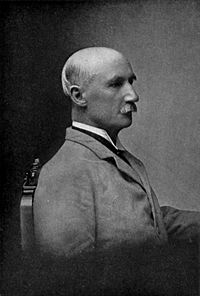Francis Brinkley facts for kids
Quick facts for kids
Francis Brinkley
|
|
|---|---|
 |
|
| Born | 30 December 1841 Leinster, Ireland
|
| Died | 12 October 1912 (aged 70) Tokyo, Japan
|
| Nationality | Anglo-Irish |
| Occupation | Military advisor, journalist |
Francis Brinkley (born December 30, 1841 – died October 12, 1912) was an Anglo-Irish journalist, writer, and expert on Japanese culture. He lived in Japan for over 40 years during the Meiji period. He wrote many books about Japanese art, culture, and buildings. He also created an important English-Japanese Dictionary. People sometimes called him Frank Brinkley or Captain Francis Brinkley. He was the great-uncle of a famous writer named Cyril Connolly.
Early Life and Education
Frank Brinkley was born in 1841 in County Meath, Ireland. He was the youngest of thirteen children. His family had many important people, including his grandfather, John Brinkley, who was a famous astronomer. His mother's family was also related to Richard Francis Burton, a well-known explorer and linguist. Like Burton, Frank Brinkley loved learning about different cultures.
He went to Royal School Dungannon and then to Trinity College. There, he was excellent at math and classical studies. After college, he decided to join the military. He became an artillery officer after studying at the Royal Military Academy, Woolwich. His cousin, Sir Richard Graves MacDonnell, who was the Governor of Hong Kong, invited him to work as his assistant in the East.
In 1866, on his way to Hong Kong, Brinkley visited Nagasaki, Japan. He saw a fight between two samurai warriors. After one warrior won, he respectfully covered his opponent. Brinkley was very impressed by this act. It made him want to live in Japan permanently.
Life in Japan
In 1867, Captain Brinkley returned to Japan and stayed there for the rest of his life. He worked as an assistant military officer for the British-Japanese Legation. In 1871, he left the military. He became a foreign advisor to the new Meiji government. He taught new artillery methods to the Imperial Japanese Navy. Brinkley quickly learned the Japanese language and could speak and write it very well.
In 1878, he was asked to teach math at the Imperial College of Engineering. This college later became part of Tokyo Imperial University. He taught there for two and a half years.
That same year, he married Yasuko Tanaka. She was the daughter of a former samurai. At that time, mixed marriages could be officially registered in Japan. Brinkley wanted his marriage to be recognized by the British government. This would ensure his wife had British nationality. After some effort and help from friends, he succeeded. They had two daughters and a son named Jack Ronald Brinkley.
From 1881 until his death, Brinkley owned and edited the Japan Mail newspaper. This newspaper was very influential in the Far East. It often supported the Japanese government because it received financial help from them.
After the First Sino-Japanese War, Brinkley became the Tokyo reporter for The Times newspaper in London. He became famous for his reports during the Russo-Japanese War (1904–1905). The Japanese Emperor Meiji gave him the Order of the Sacred Treasure. This award was for his work in improving relations between Britain and Japan. He also advised Nippon Yusen Kaisha, a large Japanese shipping company.
A British journalist named F.A. MacKenzie once wrote about Brinkley. He said that Brinkley knew a lot about Japanese life and language. But he also noted that Brinkley's newspaper often supported Japanese interests very strongly.
Brinkley's last report for The Times was written from his deathbed in 1912. He reported on a sad event: General Nogi Maresuke and his wife performed seppuku (a ritual act of loyalty) after Emperor Meiji died.
Hobbies and Writings
Frank Brinkley had many hobbies. He loved gardening, collecting Japanese art and pottery. He also enjoyed playing cricket, tennis, horse riding, and hunting. He gave some of his art and pottery collection to museums around the world. Sadly, much of his collection was destroyed in the Great Tokyo earthquake and World War II.
He wrote books for English speakers who wanted to learn Japanese. His grammar books and English-Japanese Dictionary were very important for students in Japan during the Meiji period.
Brinkley also wrote a lot about Japanese history and Japanese art. His book A History of the Japanese People was published after he died in 1915. It covered Japanese history, art, and literature from ancient times to the late Meiji period.
Death and Legacy
Francis Brinkley died in 1912, at the age of 71. This was about a month after General Nogi's death. Many important people attended his funeral in Tokyo. These included the Speaker of the House of Peers, Tokugawa Iesato, and the Foreign Minister Uchida Kosai. He is buried in the foreign section of the Aoyama Reien cemetery in central Tokyo.
Before he died, Frank Brinkley told his son, Jack, a secret. During the Russo-Japanese War, a top Japanese general, Kodama Gentarō, secretly returned home. He wanted the Japanese government to make a peace treaty with Russia. This was a huge secret at the time. But the general trusted Brinkley so much that he shared this national secret with him. This shows how much the Japanese leaders respected Brinkley.
See also
- Jinzō Matsumura
 | Victor J. Glover |
 | Yvonne Cagle |
 | Jeanette Epps |
 | Bernard A. Harris Jr. |

